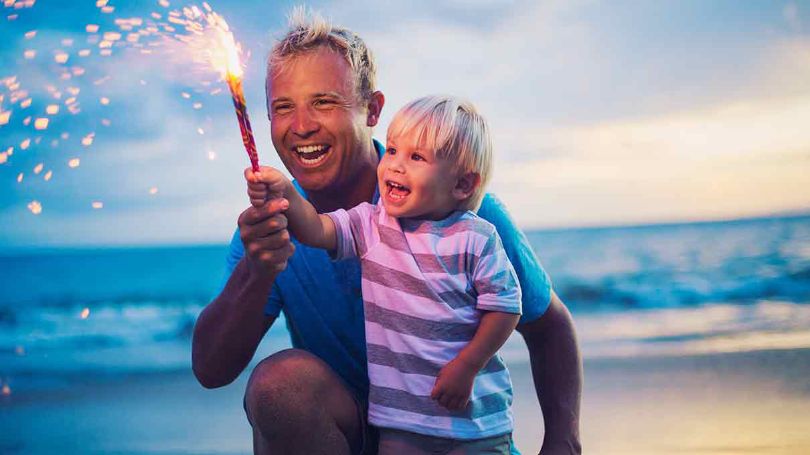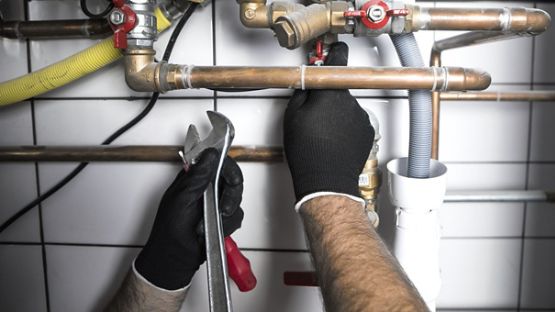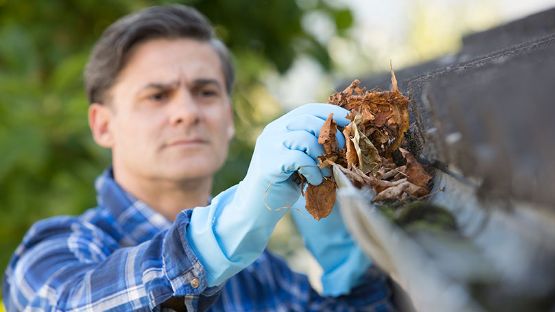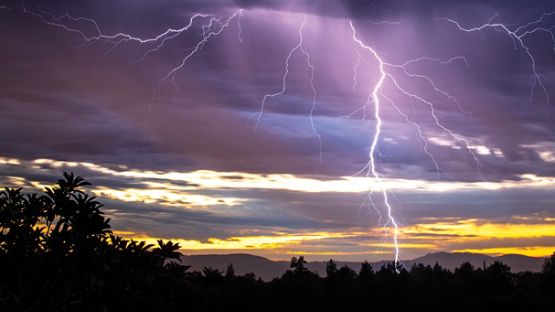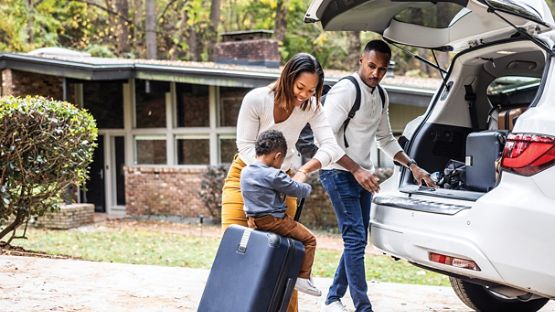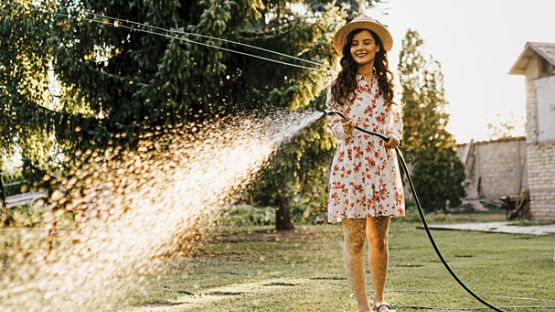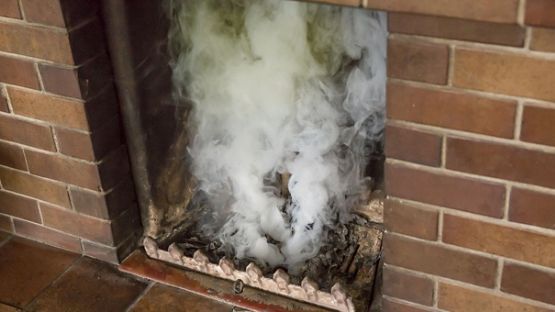Fireworks are often enjoyed as part of a celebration around holidays and events, but it’s worth remembering that they’re also dangerous explosive devices that need to be handled with care. The improper use of fireworks can result in serious injury and damage to property.
When fireworks are ignited, there's a chance an ember can land on your roof, lawn or on trees and shrubbery, causing a larger fire. Things like the condition of your property (especially the roof) and your landscaping play a role in the type (and extent) of possible damage.
Good news: You can take steps to minimize the likelihood of such damage.
Key takeaways
- Before any fireworks event, prepare your property: Clear flammable debris, secure items like firewood and propane tanks, and use spark guards on vents and chimneys to prevent fire hazards
- Set off fireworks in open spaces away from buildings, dry fields and natural habitats to avoid property damage and protect wildlife
- Keep a fire extinguisher, water bucket or hose nearby and have a first-aid kit on hand during the fireworks event
Nine tips for firework safety
If you’re considering a fireworks display, take some safety precautions to help protect your home, your loved ones and the surrounding area. Here are some suggestions:
1. Stick to public fireworks events or try fireworks alternatives
The safest way to enjoy fireworks is to attend public fireworks shows handled by professionals. Sticking to these kinds of professional fireworks displays in public spaces allows you to enjoy the full spectacle without any risk to your property.
If you still want to host a celebration on your own property, consider using alternatives to fireworks, such as laser light shows. They are similarly awe-inspiring and do not produce noises that can disturb local wildlife and upset your own pets.
2. Purchase quality, legal fireworks
Buyer beware: Always purchase consumer-grade fireworks from a licensed retailer. Avoid:
- Illegal fireworks
- Purchasing consumer fireworks from roadside “pop-up” retailers
- Purchasing fireworks from any individuals who may have obtained their fireworks from an unlicensed vendor
Remember that the safety conditions of fireworks from unlicensed sellers cannot be determined or assessed. Once you’ve got your fireworks, carefully read the manufacturer’s instructions and make sure you follow them.
3. Choose an appropriate space
Survey your property to choose an appropriate space to set the fireworks off. To avoid damage to property, you want an open space away from buildings, homes, dry fields, wooded areas or parks.
Important: Review any restrictions your province or municipality may have on where and when fireworks may be enjoyed. In areas that are at risk of wildfires, for example, even legal fireworks may be completely prohibited.
Beyond property protection, take a moment to consider your local wildlife - especially if you live in an area with a sensitive ecosystem:
- Avoid setting off fireworks in or near natural habitats, wildlife reserves, parks or areas known for high wildlife activity
- Avoid setting off fireworks during breeding or nesting seasons when animals are particularly vulnerable.
4. Prepare your property: Clear debris, secure flammable items
In the days before your fireworks event, do a little cleanup of your property. Your goal is to remove or store any items that are highly flammable or can act as kindling if embers land on them. Pay particular attention to:
- Dry garden waste like leaves, branches and flower cuttings
- Flammable materials that may have been collected in gutters and on your roof (leaves, pine needles, etc.)
- Unruly trees and shrubs (consider a little pruning)
- Firewood piles
- Propane tanks and any other flammable materials
If the weather has been particularly dry, you may want to water your lawn on the day of your fireworks to reduce the risk of fire. If your event is close to outdoor entertainment areas, consider using fire-resistant mats or covers for outdoor furniture and BBQ grills.
5. Close windows and doors, use spark guards
Spark guards or mesh covers can prevent sparks from entering vents and chimneys. (Additional benefit: They help prevent debris and animals from entering the chimney.)
On the evening of your event, ensure that all windows and doors in your home are closed. This will prevent any embers or sparks from entering and potentially igniting window treatments. Remember, all it takes is a small spark to light a fire. While the probability of some of these scenarios may seem low, it’s still best to err on the side of caution.
6. Keep a fire extinguisher and other safety gear handy
Having a fire extinguisher on your property is a good precaution for many reasons. When you’re igniting fireworks, keep it close at hand. Be sure that your fire extinguisher has been inspected, is functional and has not expired.
Also, consider having a bucket of water or hose nearby to extinguish any flames that may occur from the fireworks. Finally, keep a first-aid kit handy in case of medical emergencies.
7. Remain vigilant throughout the event
Of course, you want to enjoy your event, but fire safety is also essential. So, stay alert and vigilant when handling fireworks.
Anybody in your party who is not igniting fireworks should stand at least 25 feet (eight metres) away. The person lighting the fireworks should maintain awareness in case of misfires, flying sparks or if the firework tips over.
Never attempt to reignite fireworks, even if they haven't gone off. Wait several minutes before approaching fireworks that have failed to go off. Douse the failed firework with water and dispose of it immediately.
8. Dispose of consumer fireworks safely
Immerse used fireworks in water or sand before disposing to ensure that any burning material is completely extinguished and cannot ignite and cause damage.
Always store unused fireworks out of children's reach and in a safe place away from any flammable material. Fireworks should also be kept away from property, cars, dry grass and hazardous conditions.
9. Take a moment to review your home insurance
While taking precautions can significantly reduce the chances of damage, it's also essential to have the right home insurance coverage to protect your property in case of an accident.
Take the time to review your current home insurance policy to understand what is covered in case someone gets injured by fireworks on your property and you are held responsible.
Beyond protecting your property…
According to the Canadian government, between 2011 and 2023, there were 210 reported cases of injuries related to fireworks and similar products in Canada. While protecting your property is important, protecting yourself and your loved ones is arguably even more essential.
Ignite fireworks carefully to avoid fireworks injuries
- Avoid the use of drugs or alcohol, including smoking, and wear safety glasses. Keep your hands protected when lighting fireworks.
- Use a sturdy firing base such as a fire-resistant pail with sand, earth or another non-flammable surface.
- Never light a firework while it is in your hand. It's also recommended that you ignite your fireworks behind a sturdy, non-flammable barrier to contain the blast and to shield yourself and onlookers from sparks or flames from tipped-over fireworks.
Protect children and other spectators
- Only adults should handle the fireworks
- Anyone who is not igniting fireworks should stand a minimum of 25 feet (eight meters) away
Keep pets indoors
Fireworks can frighten pets, leading them to run away or get injured. Keep your four-legged friends inside and in a safe space. If your pet is excessively stressed, consider avoiding fireworks altogether or discussing stress management options with your vet in advance.
Be considerate of local wildlife
Fireworks also cause distress, anxiety and fear in many wild animal species. Wildlife may flee from their habitats, leading to disorientation and potential accidents. Consider these options to celebrate without upsetting your local wildlife:
- Opt for quieter fireworks or sound-reduced fireworks to lessen the noise impact on animals.
- Explore modern technological alternatives to traditional fireworks, like reusable drones and laser-based light shows. These provide safer, ‘greener’ alternatives that also present a sustainable way forward for maintaining cultural traditions.
More fireworks safety tips can be found on Natural Resources Canada and the Canada Safety Council.

